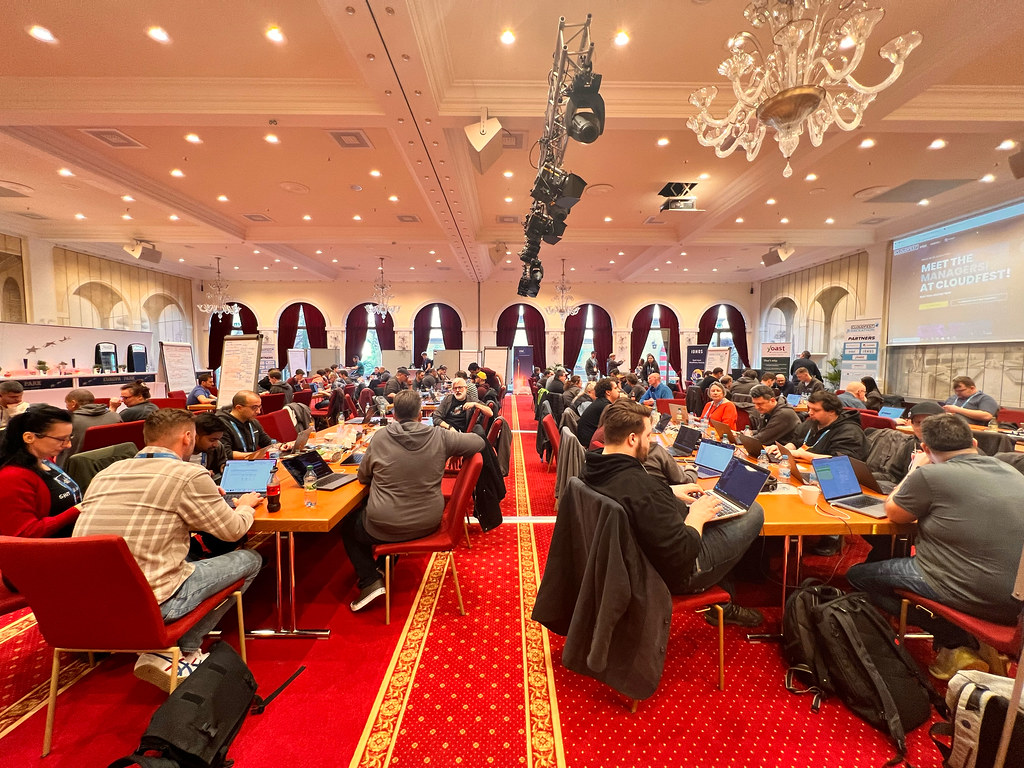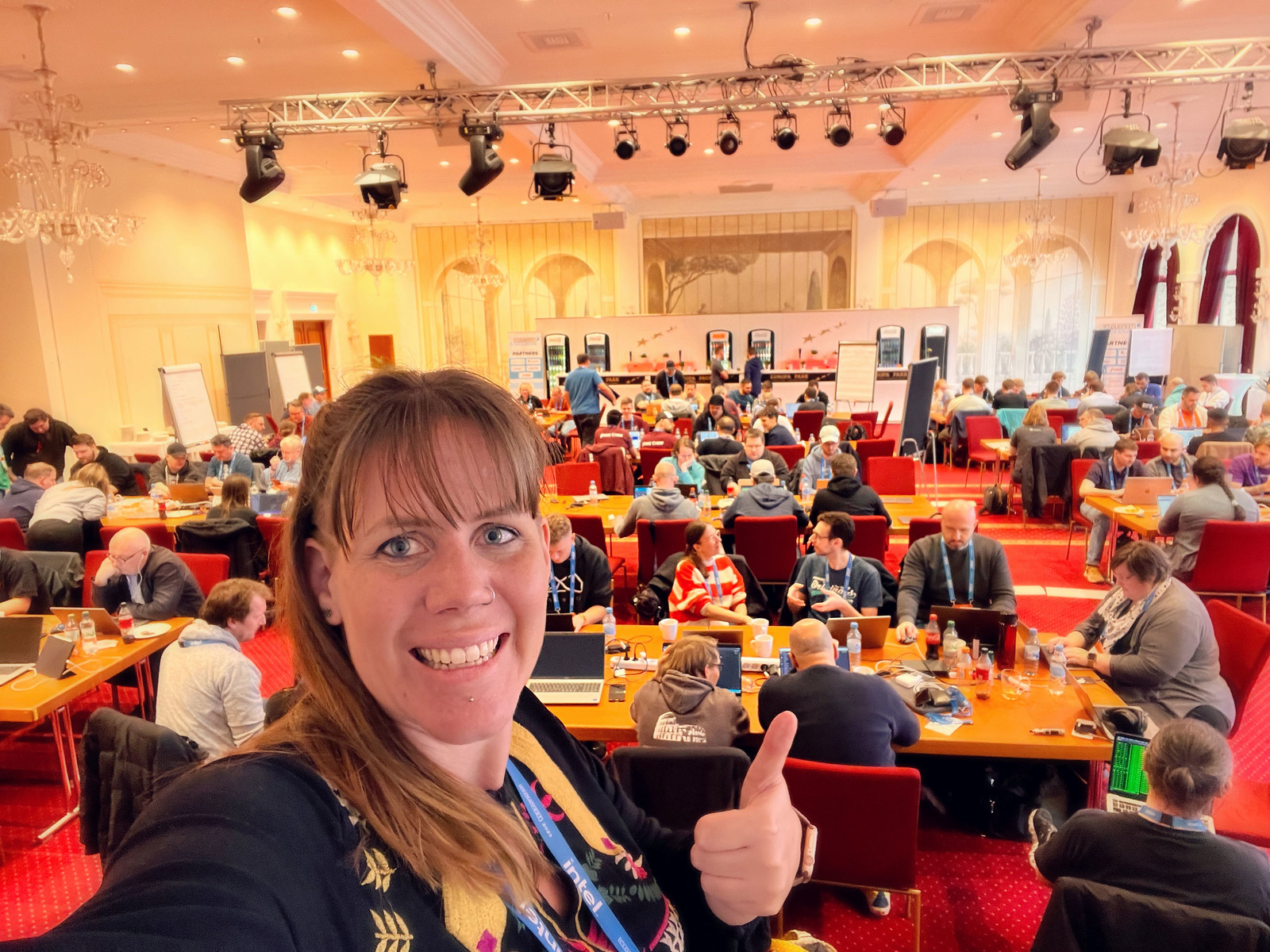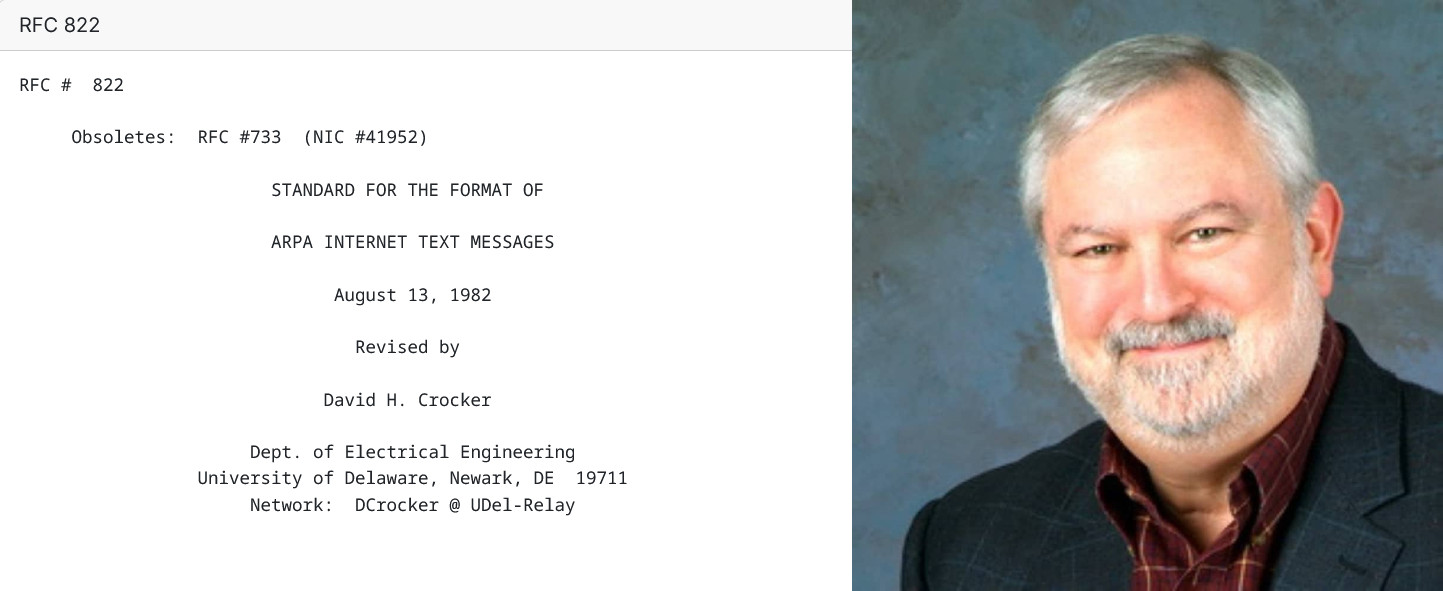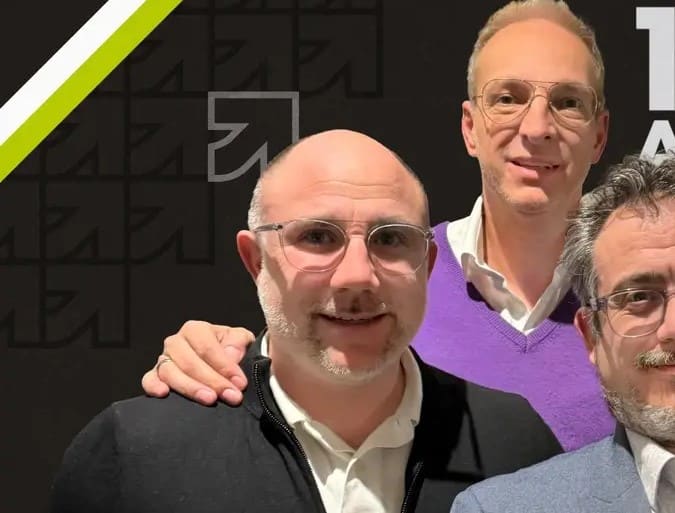CloudFest begins each year with the CloudFest Hackathon, where open-source experts tackle some of the things annoying the Cloud with real-time collaboration and deployment. The whole thing moves pretty fast, so you don’t even want to blink! As the ringmaster for this geektastic circus, Carole Olinger brings a depth of experience and sense of style to this event, making it stand out among other hackathons in all the right ways. Let’s find out more about Carole, and how she brings the CloudFest Hackathon to life!
Note that the bold text is ours: Carole didn’t just start yelling mid-sentence! Oh, and as you may have guessed, that’s her in the image above, taking a mid-Hackathon selfie.
Before we dig into some juicy Hackathon questions, could you tell us a bit about your background?
My journey has been anything but conventional! I started my career in Luxembourg, working in international banking and then spending 12 years managing teams for various government ministries. Then in 2014, I decided to completely reinvent myself—I moved to Germany and took a four-year sabbatical that changed everything.
During that time, I became a certified dog health trainer and founded a nonprofit in Luxembourg, focused on helping women with lipedema disease. But the real game-changer was discovering the WordPress community in 2016. What started as volunteering at WordCamps quickly evolved into organizing and speaking at events, and I fell in love with the collaborative spirit of open-source communities.
Since then, I’ve collaborated with leading companies in the WordPress ecosystem like Plesk/WebPros, XWP, and Yoast, focusing on marketing, brand building, partnerships, and creating meaningful connections within the tech ecosystem. Now, while based in rural Germany, I split my time between client projects and leading the CloudFest Hackathon, often working nomadically with my husband and #BuffyTheDog by my side.
It’s quite a shift from my banking and government days in Luxembourg, but every step of that journey has contributed to what I bring to the hackathon community today.
How did you get started in hackathon events? What made you want to organize one of your own?
My path to the CloudFest Hackathon started with my involvement in the WordPress community. After leaving my government career in Luxembourg, I discovered this incredible world of open-source and community-driven development. What began as simple volunteering at WordCamps evolved into organizing events and speaking about sustainability, diversity, and inclusion in tech.
My first direct experience with CloudFest Hackathon was in 2018, when I attended in a consulting role, sponsored by my then-client WebPros. After experiencing the event firsthand and recognizing its immense potential, I took over as the lead organizer the following year and have been serving as the official Head of CloudFest Hackathon ever since. The transition felt natural because it combines everything I’m passionate about—bringing diverse people together, fostering innovation, and creating positive change through technology. My experience in both the corporate world and nonprofit sector gave me a unique perspective on how to create events that balance practical outcomes with community building.
What really drew me to the CloudFest Hackathon specifically was its growing commitment to open source and its potential for real-world impact. Having built a nonprofit from scratch and worked in various roles across the WordPress ecosystem, I understood the power of bringing different perspectives together to solve problems. The CloudFest Hackathon format perfectly embodies this—it’s like a pressure cooker for innovation but with a strong focus on collaboration rather than competition. We create an environment where the goal isn’t just to build something quickly but to create sustainable solutions that continue to benefit the open-source community long after the event ends.
Who is the CloudFest Hackathon FOR?
The CloudFest Hackathon is for anyone who believes in the power of open source and wants to make a difference in the web ecosystem. While we welcome web developers, software engineers, sys-admins, and front-end and UX designers, we actively seek diversity in skills and backgrounds. You don’t necessarily need to be a coding expert—we’ve had incredible contributions from people with various skill sets.

What unites our participants is their passion for innovation and their commitment to giving back to the open-source communities. Whether you’re an experienced developer or someone who brings different perspectives to the table, if you’re excited about collaborative problem-solving and creating not-for-profit, interoperable solutions, this hackathon is for you.
There’s an image of coding events: a bunch of sweaty white dudes in a room! In real life, though, people of all genders and backgrounds are creating digital experiences. How do you broaden the scope of who takes part in the CloudFest Hackathon?
I’m proud to say that in our 2024 edition, we achieved 33% female and non-binary attendance, representing 26 different countries. This didn’t happen by accident—it’s the result of intentional effort and commitment to creating an inclusive environment. We actively seek diverse participants through our application process, provide mentorship opportunities, and ensure our project leads reflect the diversity we want to see in tech.
We’ve also partnered with initiatives like Groundbreaker Talents, which helped bring participants like Vanessa Nalugya from Uganda. She not only participated but went on to win the Dream Team Award with the project she participated in. Vanessa also presented the group’s achievements on stage during the official presentation of results. These success stories show that when you create the right environment and provide opportunities, talent knows no boundaries.
“DEI” has become a buzzword, but there’s genuine value in bringing in different experiences and points of view. How does that play out in the open-source world?
In the open-source world, diversity isn’t just about checking boxes—it’s about enriching the solutions we create. When people from different backgrounds, cultures, and experiences work together, we build better tools that serve a wider range of users. During our hackathon, we’ve seen this play out in projects like the Inclusive Language Checker for Open-Source Contributors and various accessibility initiatives that might not have emerged without diverse perspectives at the table. Check it out on GitHub!
The beauty of open source is that it’s fundamentally about collaboration and sharing knowledge. When we bring in different viewpoints, we’re not just making our code better—we’re making our entire community stronger and more resilient.
In your experience, how do open source communities’ engagement with diverse recruitment compare with that of more corporate or “traditional” tech companies?
The approaches are quite different but increasingly complementary. Traditional tech companies often focus on formal recruitment processes, diversity quotas, and structured programs—which can be effective but sometimes create artificial barriers. Open-source communities, on the other hand, naturally enable a more organic approach to inclusion because contribution can happen from anywhere, at any time, without formal credentials.
What’s fascinating is how the best aspects of both approaches are starting to merge. At the CloudFest Hackathon, we’re seeing this hybrid model in action. Through our partnership model, companies can sponsor community contributors rather than just sending their own team members, breaking down traditional corporate boundaries.
However, we still face challenges. Open-source communities need to be proactive about creating welcoming environments and providing support structures for newcomers. This is why we’ve implemented mentorship programs with experienced leaders like Lucas Radke (Automattic), Alain Schlesser (Yoast), and Thierry Muller (Google). These mentors aren’t just technical experts—they’re strong allies who actively support diversity and inclusion in tech. Their commitment reflects the values of the respective companies they chose to work with, who are leading by example in supporting underrepresented communities in technology.
For instance, Automattic has been pioneering remote-first culture for years, breaking down geographical barriers to participation. Yoast has made significant strides in creating inclusive workplace policies and actively empowering and supporting women and underrepresented folks in tech initiatives. Google’s various programs, including their Women Techmakers and Digital Inclusion initiatives, demonstrate how corporate resources can be leveraged to create meaningful change in the industry. These companies understand that diversity isn’t just about meeting quotas—it’s about enriching the entire tech ecosystem with different perspectives and experiences.
The beauty of our hackathon is that it combines the best of both worlds: the accessibility and community-driven nature of open source with the resources and structured support that forward-thinking tech companies can provide. This creates a unique environment where everyone, regardless of their background, can find their path to contribution and growth.
Now looking at professional types, what element of the Cloud ecosystem tends to be less well represented at the Hackathon?
This is actually a fascinating question because our attendee selection is deeply intertwined with the projects we’ll be tackling each year. While we have consistently strong representation from developers, system administrators, and UX designers, the additional roles we seek vary based on the specific challenges our projects aim to solve.
We’re already attracting an incredibly diverse range of professional skill sets. Security specialists, documentation writers, project managers, and quality assurance professionals all bring unique perspectives that are crucial for project success. Having worked across various sectors myself, I understand firsthand how different professional backgrounds can enhance project outcomes.
What’s becoming increasingly challenging—and exciting —is our selection process. We typically receive four times more applications than we have slots available, and every applicant brings their own unique combination of skills, interests, and motivation to the table. It’s becoming harder and harder to choose attendees because the quality of applications is consistently high across all professional backgrounds.
What makes our hackathon special is that successful projects need diverse skill sets—it’s not just about coding. Our focus isn’t on filling quotas for specific professions but rather on creating well-rounded teams that can tackle complex challenges from multiple angles. This approach has led to incredible cross-pollination of ideas and solutions that wouldn’t have been possible with a more homogeneous group.
What do you say to someone who thinks, “Oh, I could never take part in a hackathon…”?
I hear this often, and it’s usually based on misconceptions about what the CloudFest Hackathon really is. Our event isn’t about who can code the fastest or who knows the most programming languages. It’s about bringing different perspectives and skills together to solve real problems.
Think about it: What good is brilliant code if no one can use it effectively? What’s the value of an innovative solution if no one knows it exists? How can a proof of concept evolve if there’s no strategy for sustainable development, resources, and community engagement? The most successful open source projects thrive not just on code, but on the ecosystem built around them—from clear documentation and thoughtful user experience to effective project management and community building.
We’ve had amazing contributions from people who never wrote a line of code but brought valuable insights into all of the aspects I just mentioned. And here’s something personal—I’m a non-technical woman who transitioned from banking and government work to leading this hackathon. The event’s success isn’t just about technical expertise; it’s grown through combining diverse perspectives. Our project mentors bring their technical excellence, while I bring my experience in community building, event organization, and understanding of what makes projects sustainable in the long term.
The CloudFest Hackathon is designed to be inclusive and supportive. We have mentors, structured projects, and a collaborative atmosphere where everyone can find their place to contribute meaningfully. Plus, with 52 hours of high-performance fun, including side and networking activities, it’s as much about building relationships as it is about building solutions.
So the word on the street was true: you really ARE a dog behavior specialist! Is there any overlap in your tech and canine work?
Yes, that’s absolutely true! During my sabbatical, I became a certified dog health trainer. While I never pursued it as a career path, the knowledge and skills I gained have been invaluable in my personal life with my dogs and their canine friends over the past decade. And you know what? There are surprisingly many parallels between dog training and managing tech communities! Both require patience, clear communication, and understanding that every individual (whether human or canine) has unique needs and ways of learning.
My experience with dogs taught me valuable lessons about creating safe, supportive environments where learning and growth can happen naturally. These principles translate directly to how we run the CloudFest Hackathon—we focus on making everyone feel comfortable and supported, regardless of their experience level.
If you follow me on social media, you’ve probably met #BuffyTheDog—my constant companion who joins me on my semi-nomadic work adventures around the world (I wish I could collect her flying miles!). She’s my daily reminder that whether you’re working with dogs or organizing hackathons, it all comes down to the same fundamentals: building trust, maintaining consistency, and celebrating those small victories along the way.
The skills I developed as a dog health trainer—reading body language, understanding group dynamics, and creating structured but enjoyable learning environments—have become unexpected assets in my tech community work. And let’s face it, both worlds require you to stay calm and creative when facing unexpected situations. However, I must say, managing a room full of excited tech nerds can sometimes be more challenging than handling a pack of energetic dogs! 😃
You are always super-busy as soon as you get to Europa-Park, but who are you most looking to meet when you come to CloudFest?
While I’m always excited to reconnect with our returning participants and partners, I’m particularly eager to meet newcomers to our community. There’s something special about watching someone experience the CloudFest Hackathon for the first time—seeing their eyes light up when they realize the potential of what we can achieve together in three intense full days of excitement and collaboration.
I especially love connecting with people who are stepping out of their comfort zones. Whether they come from traditional tech backgrounds or completely different fields, these diverse perspectives keep our community vibrant and our solutions innovative. The magic often happens in unexpected moments—a shared laugh over coffee in the morning, an impromptu brainstorming session in the hotel lobby, or celebrating someone’s first pull request at midnight.
Watching these connections form and grow, often starting at our early-bird gathering and continuing through late-night coding sessions and Mario Kart tournaments, is what makes this event truly special. Some of my favorite memories are from seeing participants who met as strangers on Friday become close friends by Monday, planning future collaborations, or even their next meetup at another tech event.

What’s particularly rewarding is seeing how these relationships continue to flourish during CloudFest itself. Our hackathon participants often become the most engaged attendees at the main event, bringing their energy and collaborative spirit to the broader CloudFest community. They’re not just attending sessions—they’re actively connecting their hackathon experience with the industry’s bigger picture, often leading to exciting new partnerships and opportunities.
And speaking of CloudFest, it’s hands down my favorite tech event of the year. There’s something truly magical about bringing the entire industry together in an environment like Europa-Park. The combination of insightful tech discussions with industry leaders, unexpected encounters, and pure fun creates an atmosphere that’s simply unmatched. What makes CloudFest particularly special is how it seamlessly bridges the community and business worlds, creating unparalleled partnerships and business opportunities while maintaining an authentic, collaborative spirit.
What excites you most about the next edition of CloudFest?
Looking ahead to the March 2025 edition of CloudFest Hackathon, we’re building on incredible momentum. Every year, the event evolves and grows in exciting ways, but what remains constant is its power to bring together diverse perspectives and drive innovation in our industry.
Our unique format, starting with the hackathon and flowing into the main event, creates a perfect blend of hands-on innovation and industry-wide impact. While the hackathon teams develop tangible solutions to real-world challenges, CloudFest itself becomes the platform where these innovations can find their way into the broader industry.
I’m particularly looking forward to expanding our initiatives that support emerging talent and underrepresented voices in tech. Seeing how projects and connections that began in previous years have matured and evolved is always inspiring. There’s nothing quite like witnessing a casual conversation from last year transformed into a successful collaboration or innovative project.
Most importantly, I’m excited about the convergence of community spirit and professional opportunity that defines CloudFest. In an industry that moves as quickly as ours, having a space where genuine relationships can form while significant business developments unfold is invaluable. It’s this combination that makes each edition not just an event, but a milestone in our industry’s evolution.
You Need More CloudFest in Your Life
All the cool kids subscribe to the CloudFest newsletter! Not only will you get the latest news on CloudFest and the CloudFest Hackathon, but you’ll also get the latest State of the Cloud Report, which taps into the collective wisdom and insights of this community.
We hope to see you at the next edition of CloudFest, and encourage you to stay engaged with this friendly and vibrant crowd throughout the year.



